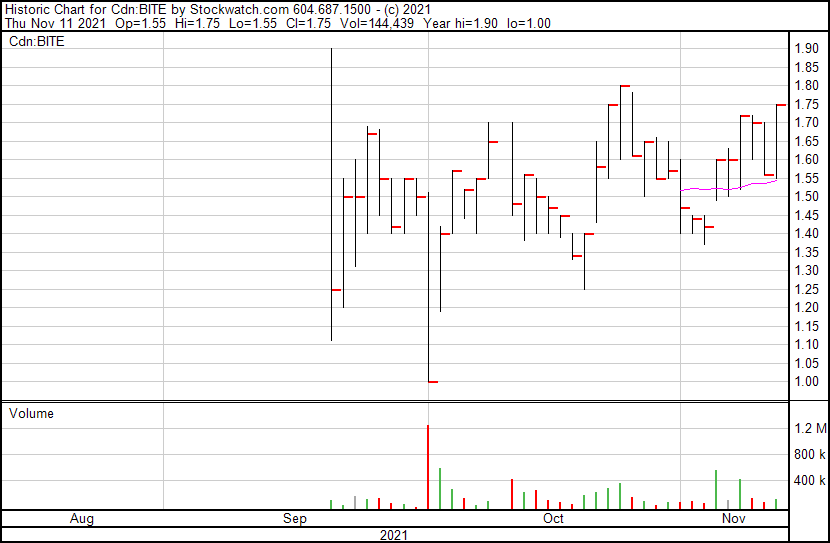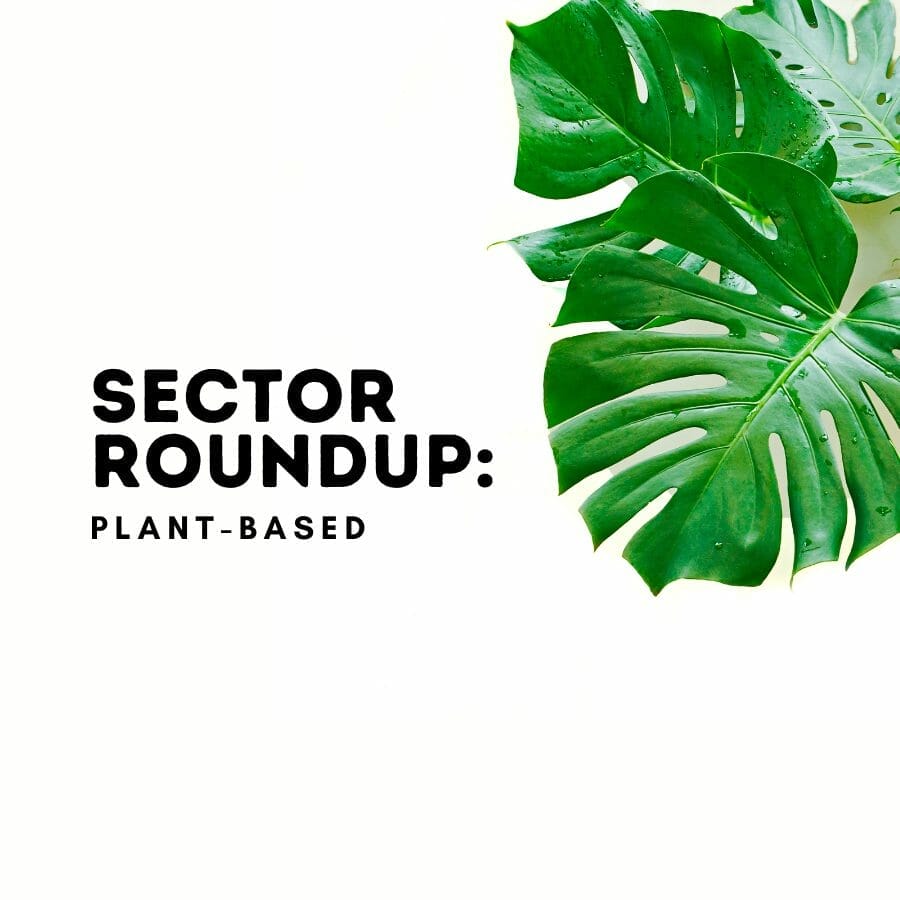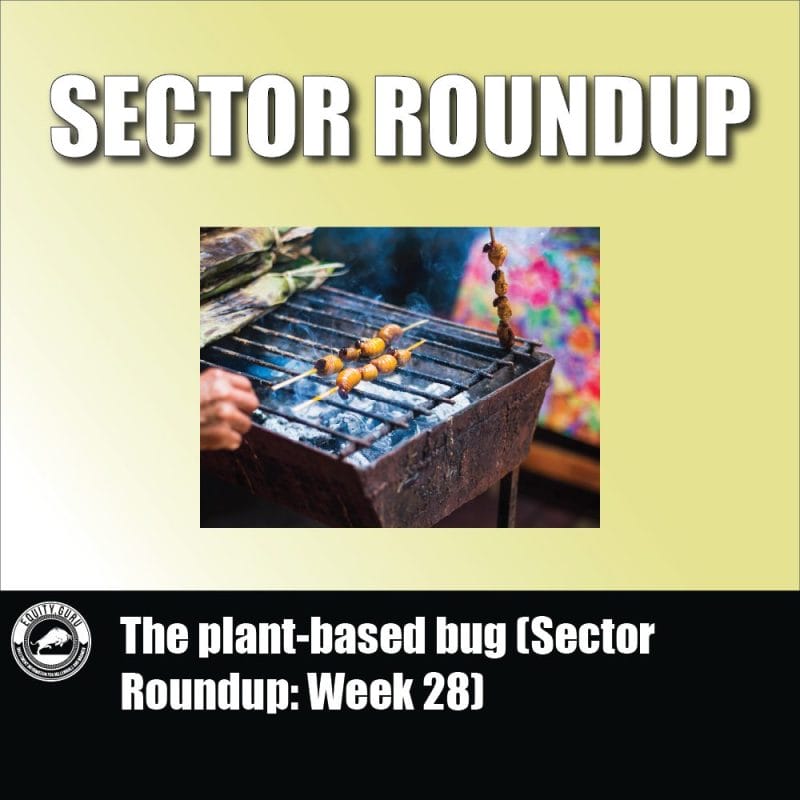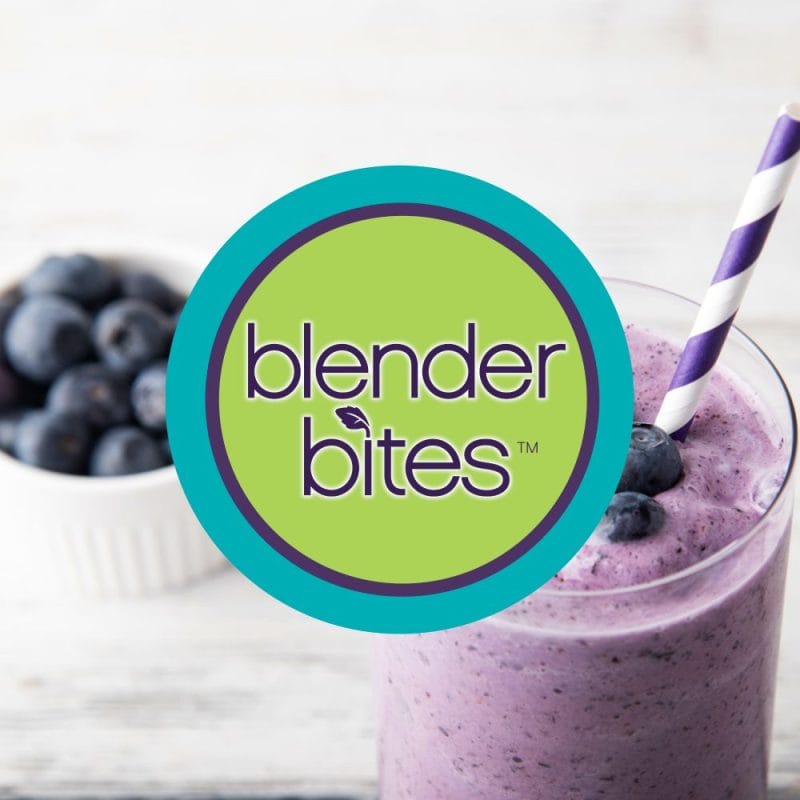Week in Review
Don’t go off on a tangent again like you did last week. Ahem. Much to my dismay, I have covered just about every publicly traded plant-based company out there, or at least the ones worth writing about. That being said, this week’s plant-based sector roundup will be a blast from the past, featuring some companies we haven’t talked about in a while. This includes Plant & Co. Brands Ltd. (VEGN.C) and Blender Bites Ltd. (BITE.C). We will also discuss Feel Foods Ltd. (FEEL.C) and Starbucks Corporation (SBUX.Q).
Before we get into that, let me give you a quick rundown of what has been going on in the plant-based sector this week. Most notably, we have the 2021 United Nations Climate Change Conference, also known as COP26. Taking place at the SEC Centre in Glasgow, United Kingdom, COP26 gathers policy-makers, scientists, environmental activists, and climate experts from the 197 member countries of the United Nations Framework Convention on Climate Change to set and work towards global climate change goals.
To put things into perspective, past COPs have produced key climate commitments such as the 2015 Paris Agreement, which aims to limit global warming to 1.5°C and was adopted at COP21. In addition to the Paris Agreement, a COP in 1997 birthed the Kyoto Protocol, an agreement promising to cut back on global greenhouse gas emissions. Put simply, COP26 presents a pivotal opportunity for global governments to unify and tackle climate change. This is giving me some Allied Shinobi Forces vibes.
In total, COP26 has four main goals:
- Keep 1.5°C of warming within reach and secure net-zero emission by 2025
- complete rich countries’ promise to put forward at least $100 billion in climate finance per year by 2020, and get international financial institutions to contribute to net-zero initiatives
- preserve natural habitats by maintaining and restoring ecosystems, which includes preparing communities for the impacts of climate change
- Work together to finalize rules proposed during the Paris Agreement and collaborate to tackle the climate crisis
With this in mind, some of the largest plant-based food companies have released an open letter calling attention to the environmental harms of animal agriculture. This letter, along with a petition with over 70,000 signatures, was presented at COP26 by Humane Society International, ProVeg International, and the Buddhist Tzu Chi Foundation. Furthermore, 16 companies including Beyond Investing, Eat Just, and Linda McCarthy Foods signed on, asking leaders to acknowledge the impacts of animal agriculture.
According to Sentient Media, animal agriculture is accelerating the climate crisis. While only accounting for 18% of the world’s calories, the livestock industry uses 77% of the land used for agriculture. As a result, agriculture contributes more than 16% of global greenhouse gas (GHG) emissions. More specifically, animal-based foods account for 57% of these emissions, whereas plant-based products make up 29%.
I am rambling again, aren’t I? Before I go on another tangent, let’s get into this week’s plant-based sector roundup.
Starbucks Corporation
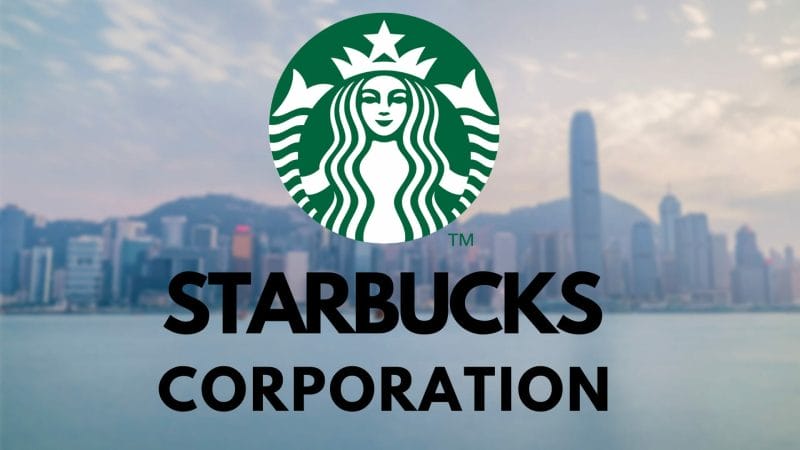
- $134.712B Market Capitalization
Starbucks Corporation (SBUX.Q) is an American multinational chain of coffeehouses and roastery reserves headquartered in Seattle, Washington. Oh, Starbucks is also the world’s largest coffeehouse chain, but you already knew that. I’ll be honest, I love Starbucks, however, I know there are also quite a few reasons to dislike the Company. For example, in 2008, Starbucks came under fire following an investigation by The Sun.
This investigation revealed that over 23.4 million liters of water were being poured down the drains of 10,000 outlets worldwide due to a policy of keeping a tap running non-stop? As much as I would love to explain, you’re better off checking out this article. That being said, Starbucks is doing its part to tackle climate change. Through its relationship with Conservation International, Starbucks is piloting forest conservation programs that link coffee farmers to carbon markets.
Under this model, Starbucks is working with farmers to carry out actions that reduce carbon emissions or sequester carbon. Additionally, the Company is using the World Resources Institute Greenhouse Gas Protocol to evaluate the major emissions from its global retail stores and roasting operations. More than 80% of Starbucks’ GHG emissions are attributable to energy for use in the Company’s stores, offices, and roasting plants. As a result, Starbucks is focusing its efforts on energy conversation and the purchase of renewable energy.
What has Starbucks been up to lately? The Company’s Starbucks Hong Kong recently announced that it has added plant-based crabcake to its menu in collaboration with OmniFoods. Founded by David Yeung, OmniFoods is a food technology firm that was created to tackle the rising footprint caused by animal agriculture. In the past, the company has supplied McDonald’s with its plant-based version of Spam, listed its imitation pork products in Whole Foods, and has launched other plant-based products into Starbucks.
With this in mind, OmniFoods’ Omni Crab Cakes will be featured in Starbucks Hong Kong’s new Thai Style Crab Cake Salad, mixed with lettuce, pumpkin, tomato, pomelo pulp, and a salad dressing made with fish sauce. I am all for plant-based crab cakes, however, Starbucks’ presence in China is a lot messier than a simple salad. Although Starbucks is a US brand, the Hong Kong franchise is operated by Maxim’s Caterers, a local company.
During the peak of the Hong Kong protests in 2019, Annie Wu, the daughter of Maxim Group’s founder, defended Hong Kong’s police. Furthermore, she criticized activists as “radical protestors” at the United Nations Human Rights Council on September 11, 2019. As a result of her comments, protestors began directing their anger towards Maxim and its franchises, including Starbucks.
Needless to say, Starbucks has a bit of a complicated history when it comes to Hong Kong. With this in mind, according to Starbucks’ Q4 and Full Year Financial Results, the Company’s China comparable store sales were down 7% year-on-year. That’s actually slightly better than estimates. Looking forward, Starbucks’ 2022 Full Year Revenue is expected to be between $32.5 and $33 billion, or 12-13% higher than 2021. Overall, Starbucks’ shares took quite the dive following its fourth-quarter earnings which came in below the Company’s and Wall Street expectations.
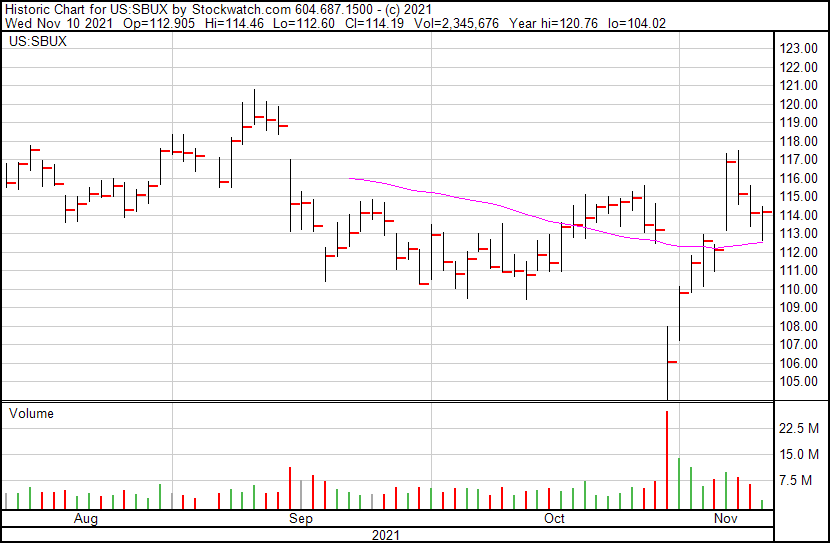
Feel Foods Ltd.
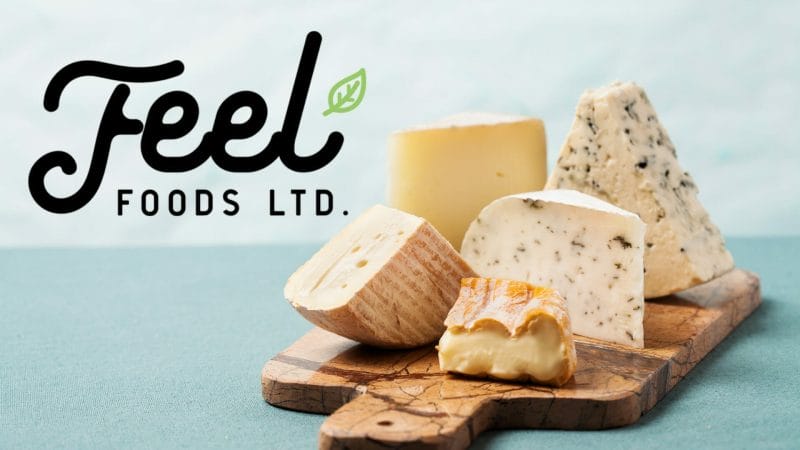
- $11.72M Market Capitalization
Feel Foods Ltd. (FEEL.C) is an agri-food holdings company focused on innovative products and technologies in the food services industry. The Company offers a variety of brands, including its wholly-owned Black Sheep Vegan Cheeze Company (“Black Sheep”), which offers a variety of 10 unique vegan dairy substitute products. Currently, Black Sheep’s products are available in over 30 retail locations.
In addition to Black Sheep, Feel Foods’ also owns 100% of the Be Good Plant-Based Foods line of plant-based chicken, pork, and beef products. If you have a sweet tooth like me, Feel Foods is also investing in the research and development of keto-friendly plant-based candy products. As someone who quite literally had a bag of Skittles for breakfast this morning, keto-friendly candy is sounding real good.
Let’s talk a little bit more about Black Sheep. Founded in 2017, Black Sheep produces a variety of vegan dairy substitute products at its Okanagan commercial kitchen and R&D facility. The company’s products are currently offered in grocery stores and food services locations throughout British Columbia (BC) including select locations at IGA, Nesters, The Very Good Butchers, to name just a few.
What has Feel Foods been up to lately? On November 10, 2021, the Company announced that Black Sheep’s products are available for purchase on multiple online marketplaces, including spud.ca, veganfoods.com, Vegan Supply online, and farmtotablemarket.ca online marketplaces.
“Black Sheep continues to grow its presence and distribution online as well as in stores and is now available in over 40 grocery stores and approximately 30 food services locations throughout British Columbia. Our Cranberry Voursin is one of our best sellers and a perfect substitute for spreadable cheeses when entertaining this Christmas season. We are currently working on launching exciting new plant-based products for you to enjoy ahead of the holiday season this year,” commented Feel Foods’ Director and CEO David Greenway.
Furthermore, Feel Foods has granted 2,000,000 restricted share units (RSUs) to a consultant of the Company. The RSUs are valid for a one-year term and are governed by Feel Foods’ RSU Plan. Getting back to the cheese on hand, the Global Vegan Cheese Market was valued at USD$2.22 billion in 2020 and is expected to grow at a compound annual growth rate (CAGR) of 12.4% from 2021 to 2028. By expanding Black Sheep’s retail presence, Feel Foods is well-positioned to capitalize on this market.
Additionally, on November 4, 2021, Feel Foods announced that it has entered into a Letter of Intent (LOI) with Plantastic Food Inc., a BC-based vegan food company, and the shareholders of Plantastic to acquire all of the issued and outstanding common shares of Plantastic. Plantastic’s products are currently offered in 22 brick-and-mortar locations throughout the province as well as multiple online marketplaces and direct-to-consumer (D2C) via the company’s eCommerce website.
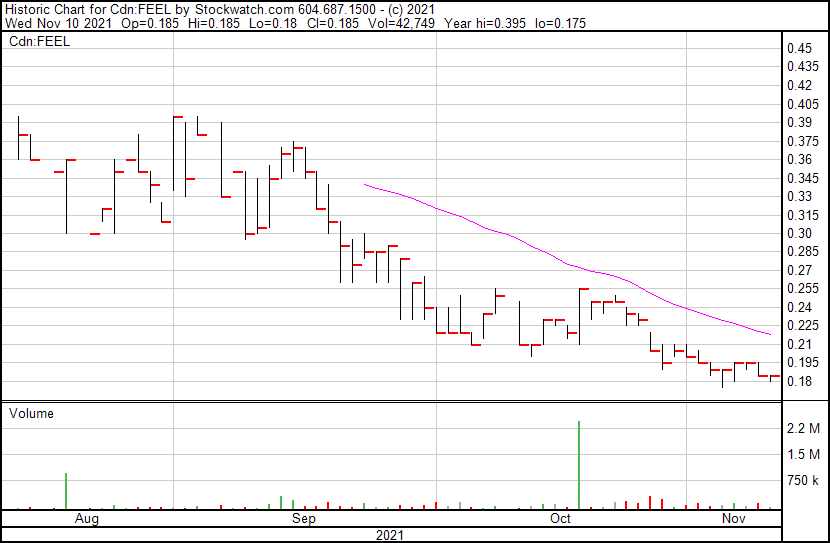
Plant & Co. Brands Ltd.
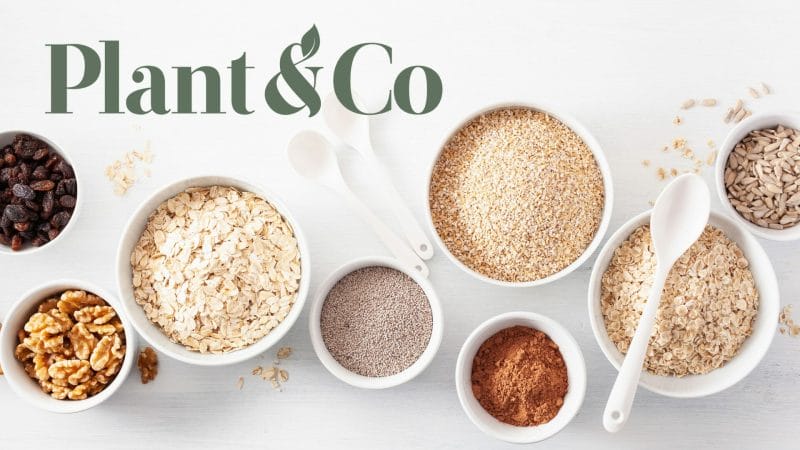
- $18.671M Market Capitalization
Plant & Co. Brands Ltd. (VEGN.C) is a modern health and wellness company curating plant-based foods. The Company offers a number of plant-based products through its two leading plant-based brands, Holy Crap Foods Inc. and YamChops, the vegan butcher. Holy Crap Foods is committed to creating products that promote a healthy gut through simple, quality ingredients. In particular, Holy Crap Foods’ Holy Crap Cereal is an organic breakfast cereal intended to help maintain a healthy gut.
On the contrary, YamChops is a plant-based butcher shop based in Toronto, Ontario. YamChops offers a variety of plant-based meat alternatives including Tunaless “Tuna”, Chick’n Schnitzel, Szechuan “Beef”, and Montreal Style “Steak”. The Company recently announced on October 21, 2021, that a range of YamChops’ plant-based foods, dishes, and meals are now available through Hungerhub’s meal delivery application, Uncatering™.
What has Plant & Co. been up to lately? On November 9, 2021, the Company announced the name of its new brand, PlantHeads™, which will play a key role in the Company’s portfolio and platform expansion. Plant & Co.’s new brand will offer high-quality recipes for the growing number of people interested in increasing their plant-based food consumption.
“Announcing our new Brand PlantHeads™ is another step on our roadmap and we look forward to sharing additional details and milestones very soon. PlantHeads™ fills a gap in our portfolio, and we are excited by the potential to create and market high-quality plant-based foods to a large and growing market across Canada and the United States,” said Shawn Moniz, CEO of Plant & Co.
According to Ipsos Retail Performance, the number of Americans following plant-based diets is up nearly 9.6 million over the last 15 years, representing a 300% increase. In total, this equates to roughly 3% of the US population or nearly 10 million people. With this in mind, PlantHeads™ is intended to enable the Company to achieve scale.
Additionally, on November 3, 2021, Plant & Co. announced that Holy Crap Breakfast Cereals are now available in 1 kg bags. Distribution of the 1 kg product range is expected to build over the coming months, however, these large-format bags are currently available online at HolyCrap.com, Amazon.ca, and soon Amazon.com. Keep in mind, the North American Breakfast Cereal Market is expected to grow from $15.8 billion in 2020 to $19.4 billion by 2026, expanding at a CAGR of 4.2%.
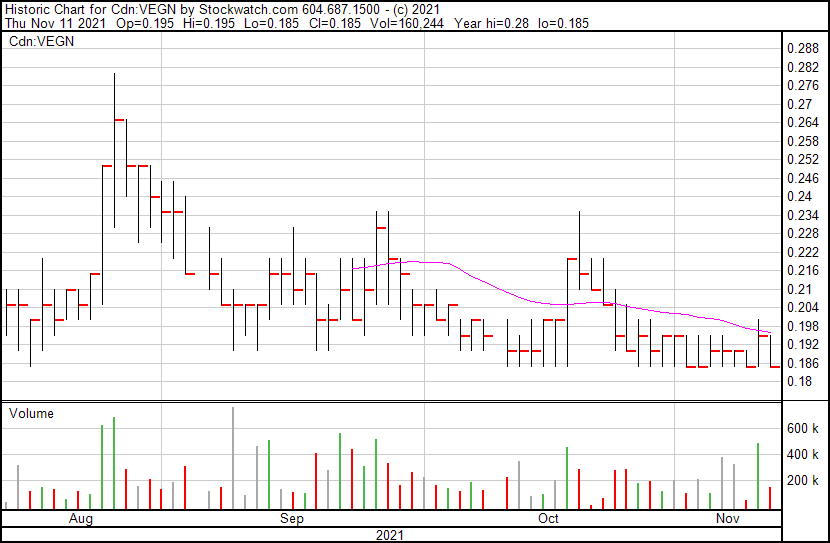
Blender Bites Ltd.
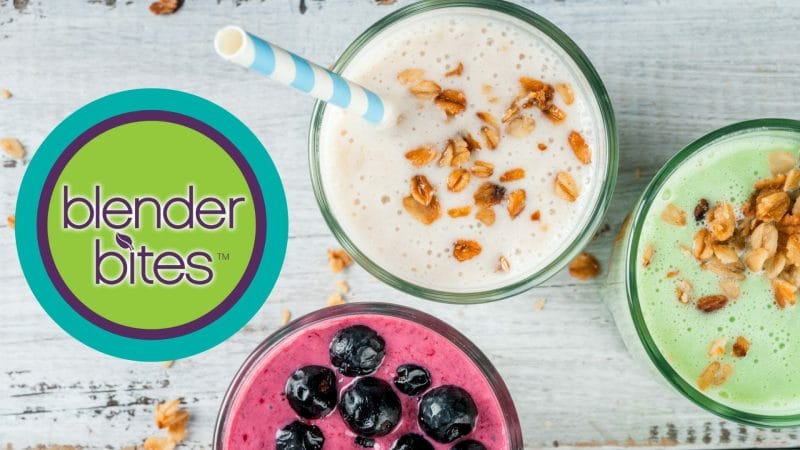
- $14.271M Market Capitalization
Blender Bites Ltd. (BITE.C) is a Vancouver, Canada-based consumer packaged goods (CPG) company founded in 2017. The Company develops and markets a line of premium frozen food products, namely its pre-portioned frozen smoothie pucks. According to the Company, if you throw these pucks in a blender with some water, you’ll end up with a smoothie. You can even toss them in a shaker with warm water and get the same result.
Blender Bites is the first company to produce a pre-portioned smoothie puck in the Canadian market. In addition to being certified organic, non-GMO, and plant-based, the Company’s pucks are available in more than 800 retail stores across Canada. In October, Blender Bites saw an impressive production increase which can be attributed to an expanded consumer base.
The Company’s consumer base grew substantially as a result of multiple Canadian Club store locations being added to its distribution channels. With a larger consumer base, Blender Bites needed to improve its capacity to fulfill orders and meet consumer demands, and they sure did.
On November 4, 2021, the Company announced that in the month of October, the production of Blender Bites’ superfood pucks increased by 2934% compared to the same period in 2020. In October 2020, Blender Bites produced 9,216 of its superfood smoothie pucks. In the same period of the current year, Blender Bites has produced a total of 279,648 smoothie pucks.
What has Blender Bites been up to lately? On November 5, 2021, the Company announced that its Power Berry and Vita-Smoothie superfood pucks have been listed by Loblaw Companies Limited, Canada’s largest chain of retail grocery stores. It is worth noting that the freezer section is typically one of the hardest sections in the grocery store to procure placement.
That being said, Blender Bites’ PowerBerry and Vita-Smoothie pucks have been guaranteed freezer space at 59 of Loblaw’s Market Division banner stores, and 107 of its very high-volume Discount banner stores. Under the Market banner, consumers will be able to purchase Blender Bites at Loblaws Limited’s affiliate stores, Zehrs, Loblaws, Your Independent Grocer, and Provigo. Under the Discount banner, Blender Bites will be available at the Real Canadian Superstore.
Additionally, on November 9, 2021, Blender Bites announced that its smoothies will now be available in additional Canadian club warehouses, which will effectively double the Company’s footprint. Furthermore, the Company’s products will be available at 60% of club locations across Eastern Canada, Canada’s most populated region and largest market.
“We are incredibly pleased with the rate consumers are buying our easy smoothie innovation, and we are working tirelessly to meet this increase in demand. We are thrilled to have had our product launch at such a reputable and prominent club store a few weeks ago, and even more excited that additional club stores have joined in to offer our healthy and convenient solution to their shoppers,” said Chelsie Hodge, Blender Bites’ Founder, and CEO.
Most recently, on November 11, 2021, Blender Bites announced that the Company had signed a distribution agreement with Vejii Holdings Ltd. Through this agreement, Blender Bites’ full product line will be available through Vejii’s eCommerce marketplace in Canada, shopvejii.com, an online marketplace for vegan and plant-based products. It is worth noting that Vejii is the largest online vegan marketplace in the US.
